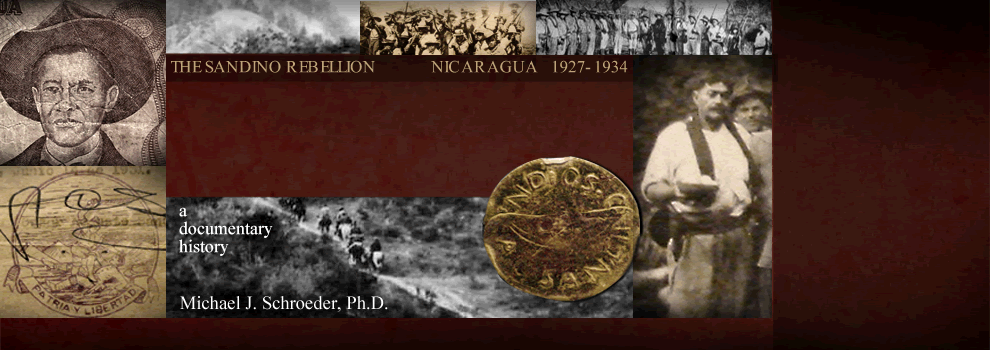|
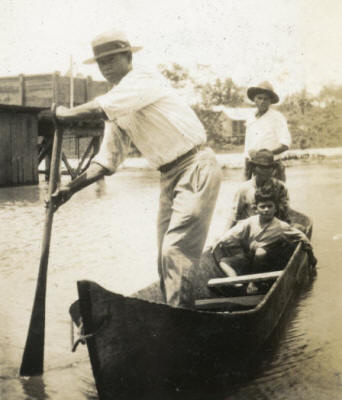 THIS IS THE third PAGE
of documents for the second HALF of 1928
on Nicaragua's Caribbean Coast
region, housing materials dated during the 26 days from August 18 to September
12.
THIS IS THE third PAGE
of documents for the second HALF of 1928
on Nicaragua's Caribbean Coast
region, housing materials dated during the 26 days from August 18 to September
12.
We see here
the conclusion of Capt. Edson's Coco
River patrol, which General Feland
considered "one of the striking
stories of the campaign ... we are
all pleased with what has been
accomplished on the Coco River"
(Aug. 28). The drive up
the Río Coco expands the Marines' &
Guardia's
knowledge of & operations in the
region and pushes the rebels deeper
into the Bocay Valley and Garrobo areas,
vast inaccessible zones that will remain
the EDSN's main refuges for the
remainder of the war. At
Waspuc, Capt. Tebbs talks of "my
Indians" and a community
church-building effort in Musawas at
a just-established Moravian station
(Aug. 21), while far to the east on
the Honduran coast, Sgt. Walter
Connelly's report on his trip to La
Cruta sheds an interesting light on
a little-discussed zone (Aug. 22). A very
fine capsule summary of the Marines'
perception of the military situation
can be found in Major Utley's Sept.
5 report on his "tentative plans"
for the future, which can be read alongside Capt.
Linscott's Aug. 28 "estimate of the
situation." A fascinating 8
Sept. report by Utley on "civilian
prisoners" shows the intersections
of labor relations, ethicity, and
politics, with two British subjects,
Johnson & Gallop, accused of
"recruiting Nicaraguan citizens for
labor" and working with the United
Fruit Company to prevent Liberal
laborers from voting. "Both
Johnson and Gallop are well known
here," writes Utley. "The
former possesses considerable
influence among the Indians and the
latter being somewhat of a leader
among the West Indians." It is
a confusing and intriguing case.
In Bluefields, Major Sage responds
sensibly (Aug. 22) to the
"complaints against civil officials
at Rama" (Aug. 5, previous page). The page concludes with another of
Capt. Edson's lovingly detailed
letters home, eight handwritten
pages to his mother waxing expansive
about the verdant tropical jungles
and his tactical plans for the
immediate future.
Overall one
sees the Marines trying to keep a
lid on things in anticipation of the
upcoming November elections, after
which, they hope, they can leave.
It didn't quite work that way, but
as we'll see, it almost did.
|
|
PERIOD MAPS
|
|
1894 mosquito
shore

27 MB,
library of congress
|
1920s
Standard Fruit

6.5 mb,
US National archives
|
1928 Rio wanks
Patrol

3 mb, us
national archives
|
1931 Moravian

2.4 mb,
coMENIus press
|
|
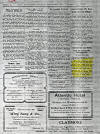
|
18 August
1928.
"Crowded Out Last Week, From Our
Prinzapolka Correspondent: The
disgruntled gods,"
The Bluefields
Weekly.
|
|
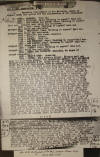
|
18 August
1928.
Air Patrol Memorandum #60
(no author
indicated), p. 1.
"1. Extracts from
Report of Air Missions, dated 18 August,
1928, are quoted for the information of
all concerned: ¶ 2. 0850 – MANAGUA: Took
off. ¶ 0940 – TRINIDAD: Panel ‘Nothing
to report’ laid out. ¶ 0955 – SAN RAFAEL
del NORTE: Panel ‘Nothing to report’
laid out. Dropped mail which was
retrieved. ¶ 1005 – YALI: Panel ‘Nothing
to report’ laid out. Dropped mail which
was retrieved. ¶ 1030 – TELPANECA: Panel
‘Nothing to report’ laid out. Dropped
mail which was retrieved. ¶ 1035 –
DIPILTO: One house occupied. ¶ 1055 –
OCOTAL: Landed. ¶ 1135 – OCOTAL: Took
off. ¶ 1145 – SAN FERNANDO: Panel
‘Nothing to report’ laid out. ¶ 1200 –
SAN ALBINO: Panel ‘Nothing to report’
laid out. Dropped mail which was
retrieved. ¶ 1205 – JICABO: Panel
‘Nothing to report’ laid out. Dropped
mail which was retrieved. ¶ 1215 –
JICARO: Panel ‘Nothing to report’ laid
out. Dropped mail which was retrieved. ¶
1315 – MURRA AND VICINITY: Deserted. No
signs of recent occupancy. ¶ 1230 –
GULKE’s CAMP: Deserted. ¶ 1235 – POTECA:
Capt. Edson’s Patrol Dropped mail and
made the following pickup: ‘TO
COMMANDING GENERAL 8618 REFERENCE
BRIGADE FIELD MESSAGE #27, DATED 8-7-28.
AT PRESENT DATE HAVE SEVEN BOATS WITH
THIS PATROL WITH NO REPEAT NO OUTBOARD
MOTORS. TOTAL CAPACITY 60 MEN PLUS
NATIVE BOAT CREWS AND EQUIPMENT. AM
RETURNING TWO BOATS TO BOCAY THIS DATE
FOR RATIONS. MOST SUITABLE BOAT FOR USE
OF RIVER PATROLS IS LARGE NATIVE PITPAN.
AVERAGE CAPACITY THESE BOATS ONE SQUAD,
LIGHT DRAFT, EASILY HANDLED BY POLE,
PADDLE OR OUTBOARD MOTOR. WILL NOT SINK
IF CAPSIZED. CAN BE EASILY FITTED WITH
MOTOR ONLY ARTICLE BEING REQUIRED SHORT
PIECE OF 2” x 4” WOOD AND FOUR BOLTS TO
SECURE SAME TO PINPAN. OUTBOARD MOTORS
NOT REPEAT NOT RECOMMENDED FOR ORIGINAL
RIVER RECONNAISSANCE. CAN BE HEARD
SEVERAL MILES AWAY. GIVE BANDITS IN
VICINITY PLENTY OF TIME TO AMBUSH BOATS
OR ESCAPE INTO BRUSH. WHEN FIRST
CLEARING RIVER ADVANCE SHORE PATROLS
ABSOLUTE NECESSITY TO PREVENT AMBUSH AND
ADEQUATELY PROTECT BOAT. AFTER CONTROL
OF RIVER IS OBTAINED OUTBOARD MOTORS
VALUABLE FOR SUPPLY AND COMMUNICATIONS,
REDUCING TRAVEL TIME ONE HALF TO TWO
THIRDS. SEVERAL BOATS SUITABLE FOR RIVER
PATROL DUTY IF MASTAWAS – POTECA AREA
NOT REPEAT NOT COMMANDEERED BY THIS
PATROL DUE TO LACK OF FACILITIES TO
BRING THEM WITH IT. WILL ENDEAVOR TO
COLLECT AS EARLY AS POSSIBLE AT POTECA
FOR FURTHER USE. EDSON, 0800’ ‘TO CO
EASTERN AREA INFO B-2 8618 INDIAN
CAPTURED 8-15-28 CONTINUES TO GIVE
ORIGINAL STORY AS FOLLOWS: CAPTURED BY
MEN UNDER SALGADO IN VICINITY OF BOCAY
ABOUT 1 JULY 1928. BANDITS COMING
THROUGH BRUSH AFTER DARK (THIS IS NOT
REPEAT NOT BELIEVED, MY OPINION HE WAS
SENT UP RIVER BY SANDINO AGENT IN BODAY)
WAS ASSIGNED DUTY AS A [section missing]
LARGE ORGANIZED BANDIT GROUPS. AFTER TWO
DAYS REST AT POTECA WILL SEND PATROL TO
GULKE CAMP AREA. YOUR 8614 1930
ACKNOWLEDGED. EDSON 0800’. ‘TO
COMMANDING GENERAL 3RD BRIG. INFO CO
EASTERN AREA. 8617 REFERENCE BRIGADE
FIELD MESSAGE NUMBER 28. FOLLOWING
RIFLES CAPTURED THIS PATROL: AT MASTAWAS
8-4-28 ONE RIFLE; AT ILILIQUAS 8-7-28
TWELVE RIFLES; AT MASTAWAS 8-9-28 THIRTY
FOUR RIFLES: TOTAL RIFLES FORTY RIFLES.
REVOLVERS CAPTURED TOTAL TWO, S.W. CAL.
30. SHOTGUNS: CAPTURED TOTAL FIVE. TOTAL
FIREARMS OF ALL KINDS: 54 OF THIS TOTAL
ONE RIFLE NOW IN USE BY THIS PATROL, 34
RETURNED TO BOCAY, 13 DESTROYED; ONE
REVOLVER NOW IN USE BY THIS PATROL, ONE
RETURNED TO PUERTO CABEZAS; FIVE
SHOTGUNS ALL DESTOYED. OF RIFLES
CAPTURED MAJORITY WERE REMINGTON AND
WESTINGHOUSE CAL. 30, MODEL 1915-16017;
ABOUT 20 OF TOTAL FOUND AT MASTAWAS WERE
UNSERVICEABLE. EDSON.’ . . . "
|
|
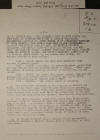
|
18 August
1928.
Air Patrol
Memorandum #60 (no
author indicated), p. 2.
"TO CO EASTERN
AREA – INFO BRIGADE – 8617 ARRIVED
POTECA 0815 THIS DATE. NO EVIDENCE ANY
FORCE OF BANDITS THIS PLACE. STRATEGICAL
POSITION FOR RIVER TRAVEL AS IT
ABSOLUTELY CONTROLS UP RIVER TRAFFIC.
WILL PATROL FROM HERE IN ALL DIRECTIONS.
PROBABLY DISPOSITION THIS COMMAND, ONE
SECTION VICINITY ILILIQUAS. ONE PLATOON
(LESS ONE SECTION) WAMBLAN, COMPANY
(LESS ONE PLATOON) POTECA. PRESENT
DISPOSITION THIS DATE, COMPANY (LESS ONE
SECTION) POTECA, ONE SECTION MASTAWAS.
LIEUT COOK IS NOW WITH ME. EDSON 0915’.
As the planes made pickup, two Fokkers
arrived to drop rations. ¶ 1205 –
OCOTAL: Landed and gave Area Commander
brief summary of patrol report. ¶ 1300 –
OCOTAL: One plane, Lt. Lamson-Scribner,
pilot, took off and dropped mail and
cleared panels at DARAILI – YALI – and
SAN RAFAEL. A message pick up was made
of routine mail at San RAFAEL. ¶ 1300 –
OCOTAL: One plane, Sgt. Frith, pilot,
took off and dropped mail and cleared
panels at SOMOTO and PUEBLO NUEVO.
SOMOTO displayed panels ‘MARINE PATROL
WEST’. ¶ 1415 – MANAGUA: Both planes
landed at Airdrome. ¶ 3. Few boats were
observed in the vicinity of GARROBO and
CASCA, and no other signs could be seen
which would indicate outlaws in this
vicinity. There were several women
around WUINA [SIUNA]and continued with
their work while the planes were in the
vicinity. Nothing suspicious was
observed throughout the area patrolled.
¶ 4. One 52U-1 airplane, Lieut. Weir,
pilot with Gy-Sgt. Kurtz, Observer, took
off Managua at 0850 and dropped mail and
cleared panels at DARIO – MATAGALPA –
TUMA – CORINTO RANCH – ALGOVIA – ULUSE –
MUY MUY – BOACO and returned to MANAGUA
at 1130. Nothing suspicious was observed
in the area patrolled. There is a large
level field two miles NORTH EAST of MUY
MUY which, it is believed would make a
good emergency landing field, if cleared
of about twenty five trees and stumps. ¶
5. Two Fokker Transport planes dropped
twenty two hundred pounds of rations to
Captain Edson’s patrol at POTECA, at
1130 this date."
|
|

|
18 August
1928 (1430).
Radiogram from Capt. M. A. Edson, Coco
Patrol at Poteca, to Major H. H. Utley,
Puerto Cabezas.
|
|
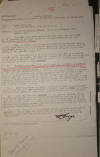
|
20 August
1928.
Report on Augustin Solano, former
Commandante, Pearl Lagoon,
Major
A. B. Sage, Bluefields.
"1. For some time
past numerous reports have been
submitted by the inhabitants of Pearl
Lagoon on the activities of the then
Commandante, Augustin Solano. ¶ 2. None
of these reports were of a serious
nature and were as a rule those
involving the arrest of people for minor
offenses such as drunkenness, being out
on the streets after 8:00 P.M., at
night, violation of the sanitary laws,
etc. ¶ 3. An investigation into these
reports was made by a Guardia Officer
and as is usually the case the persons
who uttered the complaints would not or
could not state facts and no definite
information could be obtained on which
to base charges. ¶ 4. A rumor to the
effect that Solano was receiving a
retainer fee from the Nicaraguan
Mahogany Company and from the Vrooman
Lumber Company was also investigated. I
believe that the statement is true. It
has been the custom heretofore for Civil
Police Officials to accept a fee from
the mahogany and banana companies not
for any particular service rendered but
rather to prevent the Commandante from
interfering with the workings of the
companies. All the mahogany and lumber
companies carry a secret ledger carrying
funds for expenditures of this nature
and nothing short of a court order would
reveal the existence of the workings of
such a system. ¶ 5. Augustin Solano has
always presented a well dressed
appearance, lives well and comfortably
and apparently had no sources of income
outside of his salary of $40.00 per
month as a Civil Police Official. ¶ 6.
This man has been relieved by the
Guardia Nacional Police at Pearl Lagoon
and it is my urgent recommendation that
any attempts that may be made through
the government at Managua to appoint him
to any other civil police or government
position in this Area be blocked as I am
firmly convinced that this man has
accepted bribes and that he is not an
honest public servant. ¶ 7. The Guardia
Officer at Pearl Lagoon has been
instructed to endeavor to obtain
absolute facts that may be used as a
basis of charges against this man and if
obtained they will be forwarded to
Headquarters. ¶ A. B. Sage."
|
|

|
20 August
1928.
Radiogram from Capt. A. DeCarre, Bocay,
to Major H. H. Utley, Puerto Cabezas.
"To: C. O. Eastern
Area: - Bocay Aug. 20, 1928 ¶ Your 8619
-2300. ¶ The only native Indian in Bocay
named JESUS is here now. He was
appointed Commandant by Sandino when
Sandino was along with Moncada here at
Bocay between January 25 and February
15th. Jesus remained as Commandant until
about May 15th. Around that date Sandino
was at GARROBO and he sent to Bocay for
Jesus to report to him. Jesus remained
in Bocay and around May 30th SALGADO
passed through Bocay and took Jesus with
him. ¶ Jesus returned to Bocay around
June 21st and has been in Bocay ever
since. ¶ (This report comes from
Thompson). ¶ /s/ A. DeCarre, Major, U.
S. M. C. ¶ Aug. 21st. ¶ P. S. I
Interviewed Jesus this date and the
above is the substance of the
interview."
|
|

|
20 August
1928.
Radiogram no. 2 from
Capt. A. DeCarre,
Bocay, to Major H. H. Utley, Puerto
Cabezas.
"To: C. O. Eastern
Area. Bocay Aug. 20, 1928. ¶ There is a
rumor in the village of Bocay that
Sandino passed the word among his men at
Poteca that he has been called to
Mexico. ¶ /s/ A. DeCarre, Major, U. S.
M. C."
|
|

|
20 August
1928 (1701).
Radiogram from Major H. H. Utley, Puerto
Cabezas, to Capt. A. DeCarre, CO Marines
Bocay.
"TO CO MARINES
BOCAY INFO CO MARINES WASPUC ¶ FROM
COMDR EASTERN AREA 20 AUGUST, 1928 ¶
8620 DISTRIBUTION OF FIFTY NINTH COMPANY
AS SHOWN BY RECORDS OF THESE
HEADQUARTERS STOP MASTAWAS FIFTEEN STOP
BOCAY THIRTY ONE STOP SUSANWAS NINE STOP
EN ROUTE BOCAY FROM WASPUC NINETEEN STOP
AWAWAS EIGHT STOP WASPUC ELEVEN STOP EN
ROUTE WASPUC FROM CAPE GRACIAS THIRTEEN
STOP EIGHTEEN ENLISTED TULSA DETACH EN
ROUTE WASPUC FOR BOCAY STOP AT BOCAY
DENVER DETACH SEVEN COMMA GALVESTON
THREE STOP THIS NOT INCLUDING NAVY
PERSONNEL COMMA OFFICERS COMMA AND RADIO
OPERATORS STOP PLEASE REPORT REGARDING
CORRECTNESS OF THESE FIGURES STOP BOCAY
RIVER PATROL WILL CONSIST OF ONE PLATOON
STOP DENVER AND GALVESTON MEN AND ONE
RADIO SET WITH CARROLL SHALL JOIN COCO
PATROL STOP RADIO OPERATOR FOR BOCAY
RIVER PATROL WILL BE SUPPLIED LATER STOP
1701"
|
|

|
21 August
1928.
Drop message to Lt. Whaling, La Luz,
from Lt. W. C. Hall, by direction,
Puerto Cabezas.
|
|

|
21 August
1928 (1345).
Radiogram from Capt. Tebbs, CO Waspuc,
to Major Utley, Puerto Cabezas.
|
|

|
21 August
1928 (1623).
Radiogram from Gen. Feland, Managua, to
Major H. H. Utley, Puerto Cabezas.
"TO: COMDR EASTERN
AREA. 21 AUGUST 1928 ¶ FROM: COMDR
SECBRIG MANAGUA. ¶ 8620 TODAY PLANES
MADE FOLLOWING PICK UPS FROM EDSON STOP
QUOTE 8518 THREE ENLISTED DENVER
DETACHMENT ONE GALVESTON DETACHMENT
EVACUATED HOSPITAL CABEZAS VIA BOCAY
2100 BOCAY 2100 EIGHTEENTH STOP ABRAM
RIVERA PRISONER ALSO EVACUATED CABEZAS
SAME TIME COMMA HAS BROTHER COMMA LOUIS
RIVERA COMMA WORKING SIKISQUAS FORMERLY
HIRED BY RIP DAVIS 0910 UNQUOTE AND
QUOTE 8620 PATROL ONE PLATOON LESS ONE
SQUAD UNDER LIEUTENANT COOK STARTED
RECONNAISSANCE GULKES CAMP AND WILL
REPORT ON RESULTS OF AERIAL BOMBING STOP
DAILY ROUTINE PATROLS SOUTH ALONG COCO
RIVER FROM HERE 0755 UNQUOTE EDSON
STATES THAT ABOUT FIFTY FIVE PERCENT HIS
COMMAND UNDER QUARANTINE TREATMENT FOR
MALARIA STOP 1623"
|
|
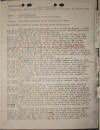
|
22 August
1928.
Complaints against civil officials at
Rama, Major A. B. Sage, Bluefields, p.
1.
"1. The enclosure
was received in this office on August 8,
1928, and an investigation was
immediately made into the various
complaints contained therein with the
following results. ¶ Information was
sent to the signers of the letter to the
effect that an officer of the Guardia
would be present in Rama from August 14,
1928 to conduct an investigation into
the subject matter and requesting them
to appear. All of the signers of the
letter left town on the notification and
all failed to appear during the time
that the investigation was under way.
The signers were all Liberals and the
parties named in the letter as offenders
are conservatives. It was found that all
the persons named in the letter as
having been offended against had left
town previously and that all the cases
in question happened during 1926 and
1927. Some information was obtained but
it is all hearsay and there were no
definite, concrete facts developed on
which to base charges. ¶ The charges set
forth are described in detail. The
present Alcalde was installed by the
armed forces in Rama in 1926 and has
been continued to this day. The ballot
boxes of the 1927 election at Rama were
lost overboard and the votes not
counted, the present Alcalde retaining
his seat. It is probably true that he is
not seated in accordance with the law
but the situation is so complicated that
nothing can be done at this time and the
approaching elections will rectify the
conditions. The charges of assaults
preferred against the Alcalde are
probably true although no one would come
forward and testify to the facts. ¶ The
charge of collection of head tax is
impossible to prove, it appears that
this happened in 1926 and was a measure
taken during the revolution. ¶ Liquor
may have been sold at a higher price
than fixed by law but it is not being
done now. The price for which sold by
the fiscal agent is $1.22 a quart when
sold in large quantities and $1.30 when
it is necessary to draw off small
quantities for sale in bottles. ¶ The
persons who were supposed to have been
fined could not be located. This may
have happened but the facts cannot be
determined. The Commandante of the
Hacienda Guard has no authority to
assess fines. This power lies in the
hands of the Administrator de Rentas at
Bluefields and all cases of persons
arrested for making guaro are sent here
for trial. It may have happened during
the revolution and it is quite probable
that it did but it has not been done
since the arrival of the Guardia here. ¶
The matter of the slaughtering of the
cattle without proper report is correct.
When the Guardia took over Rama this
matter was taken up with the municipal
authorities, a place designated as the
slaughter house, and the butcher
required to submit a monthly report
showing owners name, sex, color, brands,
etc. This report is vised [sic]
by the Sub-Division Commander and
forwarded to the Jefe Politico . . . "
|
|
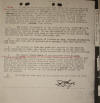
|
22 August
1928.
Complaints against civil officials at
Rama, Major A. B. Sage, Bluefields, p.
2.
" . . . ¶ 2. It
can be stated definitely that since the
Guardia Nacional relieved the civil
police at Rama that none of the abuses
mentioned in the letter have happened. I
believe the basic reason back of the
charges is an effort on the part of the
signers to cause trouble for the
officials mentioned. From the evidence
adduced by the investigation I would
state that there is nothing on which
charges could be based which would
result in the conviction of any of the
personnel mentioned before any court nor
is there sufficient evidence available
to recommend their removal from office.
¶ 3. The former Commandante of the
Hacienda Guard, Jacobo Moreira,
appointed Director of Police at
Bluefields upon the death of the
Director, General Gomez. He has
cooperated with this office in matters
and no cases have come to the attention
of this office that indicate any
partiality, unjust decision, etc. ¶ 4.
The former Commandante of Policia at
Rama, Gustavo Balladares, has left that
town and is employed at a mahogany camp
near Muelle de Los Bueyes. ¶ 5. The
Alcalde at Rama has given his support to
the Sub-Division Commander at Rama, has
helped in the clean up of the town and
it is known that he is making proper
disposition of the fines collected. ¶ 6.
The present Commandante of the Hacienda
Guard at Rama, Elisio Largaespada,
appears to be a weak kneed sort of an
official and does not possess sufficient
nerve to collect fines from any person.
He reports to the Sub-Division Commander
whenever he leaves on a patrol and a
member of the Guardia accompanies the
patrol, merely for the purpose of
becoming familiar with the trails and
people. In reality he is detailed to
accompany the patrol for the purpose of
reporting upon any attempt on the part
of the Hacienda Guard to defeat the ends
of justice. ¶ 7. No reply has been made
to the signers of the letter by this
office. ¶ A. B. Sage."
|
|
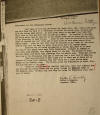
|
22 August
1928.
Memorandum for the Commanding Officer,
Sgt. Walter L.
Connelly, Cape
Gracias (Cabo Gracias a Dios).
"Left Cape at 6:00
A.M., on horses for Cruta, Nic. The
first river about one mile from the Cape
it is necessary to unload the horses
cross in boats and have the horses swim
across. At this river there is one small
boat that will carry four or five men
this boat is used as a ferry. We
traveled in the bush for seven miles
then we came out on the second river and
as there were no boats is was necessary
to swim across. After we left there we
traveled up the beach until we reached
the last river and at this river we were
taken across by an Indian woman. After
we left this river we traveled up the
beach for two hours then we went into
the bush for about three miles until we
reached Cruta. ¶ Received the following
information at Cruta, Nic., that on or
about the 14th of this month there were
fifty Honduran soldiers in command of a
Lt. Col., name unknown, they stayed
there for one day. The uniform of these
men were khaki with white caps something
like the marine caps. These men crossed
the river to the Nicaraguan side and in
crossing lost a boat load of supplies. ¶
They were supposed to meet sixty more of
their men at Cruta but on account of
losing their supplies they left Cruta
for a place called Duley Fumbry on the
Honduras side. The Lt. Col asked the
Commandante at Cruta, Nic. how many men
were at the Cape. ¶ Found out from Mr.
Ames an American that lives there that
Sandino’s men are crossing the Patuca
River, and are going through the
mahogany camps on the Honduras side. On
their way back they are using the
Wuankibila trail that goes to Waspuc. ¶
Walter L. Connelly. ¶ Sergeant, USMC."
|
|

|
23 August
1928 (1042).
Radiogram from Major H. H. Utley, Puerto
Cabezas, to Gen. Feland, Managua.
|
|

|
23 August
1928 (1950).
Radiogram from Capt. Tebbs, CO Waspuc,
to Major H. H. Utley, Puerto Cabezas.
|
|

|
23 August
1928 (2000).
Radiogram from Capt. Tebbs,
CO Waspuc,
to Major H. H. Utley, Puerto Cabezas.
|
|
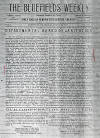
|
25 August
1928.
"Departmental Board of Sanitation,"
The Bluefields Weekly.
|
|
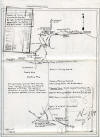
|
25 August
1928.
Sketch of Trails La Luz and Pis Pis
Regions, Capt. W.
N. Best, USMC.
|
|

|
26 August
1928.
Weekly Report, Capt. H. D. Linscott,
Cuvali, Nicaragua.
"CUVALI, NICARAGUA
¶ August 26, 1928 ¶ From: CAPT. H. D.
LINSCOTT, USMC ¶ To: THE COMMANDER, EAST
COAST AREA. ¶ SUBJECT: WEEKLY REPORT. ¶
1. Following report herewith submitted:
¶ August 19 – 600 lbs provisions arrived
from LA LUZ. Bought horse for $15.00 and
mule for $40.00. Corporal SELF, in
charge of the provisions, reported
ARROLIGA and two men had passed over
part of MATAGALPA TRAIL between ALO AND
AGUA CALIENTE about August 12th. Could
not track them on account of rain.
Natives disclaimed knowledge of their
present whereabouts. ¶ August 20 – Sent
1st Sgt RIEWE and one man back to LA
LUZ. Plane over 1:30. Dropped official
mail. Made one pick up – one pick up
lost. ¶ August 22 – Patrol to HIYAS and
return. All quiet. Secured 2 horses,
owners unknown. ¶ August 23 – Patrol
short distance up BOCAY TRAIL and
return. All quiet. ¶ August 25 – Patrol
to HIYAS and return. All quiet. ¶ 2.
Present strength 1 officer 42 enlisted.
¶ 3. Pack animals on hand – 7. Rations
on hand 2380 pounds."
|
|
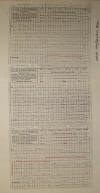
|
1. 27 August
1928 (0020).
Letter from Capt. M. A. Edson,
Poteca,
to Major H. H. Utley, Puerto Cabezas, p.
1.
[Message is
admittedly hard to read, but with effort
one can make out most of it. Time
to return to the LOC.]
|
|

|
2. 27 August
1928 (0020).
Letter from Capt. M. A. Edson, Poteca,
to Major H. H. Utley, Puerto Cabezas, p.
2.
|
|

|
3. 27 August
1928 (0020).
Letter from Capt. M. A. Edson, Poteca,
to Major H. H. Utley, Puerto Cabezas, p.
3.
|
|
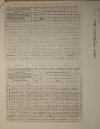
|
4. 27 August
1928 (0020).
Letter from Capt. M. A. Edson,
Poteca,
to Major H. H. Utley, Puerto Cabezas, p.
4.
|
|
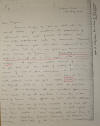
|
1. 27 August
1928.
2nd Letter from Capt. M. A. Edson,
Poteca, to Major H. H. Utley, Puerto
Cabezas, p. 1.
"Dear Major:- ¶
Sergeant Murphy has told me that when he
was at BOCAY, you mentioned the
possibility of replacements being sent
forward to relieve the two ships
detachments under my command. Personally
I am wondering just where these
replacements are to come from, but if
they are formed and become available
please consider the following.
Personally I would prefer to be left out
in this region until permanently
relieved. It requires a certain amount
of [initiative] to get back into the
stride of outing it after a period of
more or less relaxation in Puerto
Cabezas and now that I am where I would
like to stay until ordered back for
good. Although Cook is not so definite
about it. I would like to keep him here.
He is developing into an excellent
patrol man – so ready to go at any time
– and has a keen sense of humor which
affects my own somber attitude. ¶ The
men are of course anxious to go back out
at any time and believe any rumors to
that effect they hear, although I have
respectfully advised them to order their
Christmas presents addressed to POTECA
or vicinity. About 60% of the men are
under malaria (quinine) . . . "
|
|
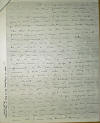
|
2. 27 August
1928.
2nd Letter from Capt. M. A. Edson,
Poteca, to Major H. H. Utley, Puerto
Cabezas, p. 2.
" . . . [section
missing] and infected hands are quite
[section missing] these faults are
undoubtedly due [section missing]
service in the bush. The Denver has a
larger percentage of its men on the sick
present list, although the Galveston
have been out for the longer straight
stretch from Puerto Cabezas. The other
organizations in the Eastern Area are
probably finding the same troubles and I
do not believe replacements by those
units help very much. New blood from the
States would probably be the solution to
these ills but that would mean recruits
who would not be as good as the few fit
old men I have with me. However if you
do relieve this ships detachment – as I
mentioned above – I would prefer to
receive [undercclass] replacements to
the Coco Patrol and be left in command
of that unit rather than a relief by
organizations, if such a thing can be
done. ¶ DeWitt tells me Lt. Pollick has
been ordered to the Galveston. When does
he arrive in Cabezas and does he join
his organization here? ¶ We will all be
glad when our own planes are operating
once more. A few magazines would be
welcome if we stay here any length of
time. If you can give me some [idea] as
to the permanence or otherwise of this
post, I would appreciate it. Bourne and
the west coast ships have given us
excellent service but I miss Wop
Howard’s messages which he . . . "
|
|
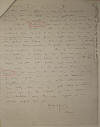
|
3. 27 August
1928.
2nd Letter from Capt. M. A. Edson,
Poteca, to Major H. H. Utley, Puerto
Cabezas, p. 3.
" . . . [sends now
& then]. ¶ Am sending Shearer a copy of
the certificates used by the 11th Rgt.
to cover gratuitous issues. He may be
using something similar at the present
time. ¶ I think Ridderhof has some idea
of the way we have been operating. After
reaching his camp, I overhead him remark
to one of his men who was complaining
about his food – ‘After seeing the way
the patrol at Poteca is fixed for
rations, I do not think we have anything
to growl about and should consider
ourselves lucky.’ One of his recruits
was telling a buddy of his who did not
come here that this (Coco Patrol) is
certainly a tougher looking outfit with
beards and everything. ¶ Send my best to
the aviators, doctors, and Hall. He
seems to be the only one left out of
these reports but he is by no means
forgotten. Those hands better stand [up
for] duty when and if I get back to
post. Thank you for the interest you
have taken in our activities and the
super support we can always expect from
you. ¶ Respectfully, ¶ Edson."
|
|
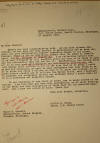
|
27 August
1928.
Letter from Major H. H. Utley, Puerto
Cabezas, to Major Hans Schmidt, Managua.
"My dear Schmidt:
¶ Thanks for your congratulatory note.
As you have already discovered, we had
gone one step further in anticipation
and we were prepared for your
anticipatory request regarding damage to
the mines. However, stand by for an
additional demand from the owner or
owner’s agent, one Mr. Springer of
Bluefields. I am collecting further data
in re what I believe he will complain
about and hope to be ready to give you
the information when you ask for it.
Incidentally, his record shows him to be
very much anti-American and particularly
anti-Marine, and last Sunday while
calling on him in the hope that by so
doing I could adjust his complaint, he
made so many statements that were known
to me to be false and which I believe he
knew to be false and intended to impress
others present and to belittle the
Marine Corps, that I declined to
continue the conference further and
withdrew while I could still do so in a
courteous and dignified manner. ¶ We are
beginning to run short of boats, due to
heavy losses in the rapids. I am told
that you have some photographs, or at
least somebody on the Staff has some
photographs of those made for the
Eleventh Regiment. May I have two copies
of each? Thank you. ¶ With best wishes,
sincerely, ¶ HAROLD H. UTLEY, ¶ Major,
U.S. Marine Corps."
|
|
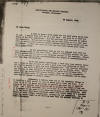
|
28 August
1928.
Letter from Gen. Feland, Managua, to "My
dear Utley," Puerto Cabezas, p. 1.
"My dear Utley: ¶
I want to have a note ready for the next
plane going over to you. I expect that
will be in a few days. The plan is to
send you three of the four amphibians.
The two now here were received in rather
bad condition. But as fast as they can
be made ready we will send them over so
that you have at Puerto Cabezas three
active planes and one in reserve. I will
not send the last one from here unless
your total falls below three. ¶ As you
undoubtedly know we are all pleased with
what has been accomplished on the Coco
river. Edson’s persistent advance and
successes gained make up one of the
striking stories of the campaign. Please
do not be sparing in your
recommendations for awards or
commendations as you feel they are
deserved. ¶ As to the future operations,
I have only some general ideas, but I
think we will be able to make a good
plan soon depending on where the bandits
decide to make the main concentration.
The locality indicated at first, and
still indicated to some extent, is the
Garrobo area. There are bunches of them
foraging in Segovia and south west of
Santa Cruz. I think they may concentrate
around Garrobo, they may try to
concentrate around the Murra area, or
they may decide not to concentrate but
to maintain smaller groups in several
areas. ¶ Personally I believe that one
of the essential things is to build up a
good patrol or line of guard posts along
the Coco. I believe it is to our great
advantage to prevent any more men or
supplies coming to the bandits from
Honduras and to prevent the return of
any now there. And I have concluded that
it is also well to keep those we now
have in Nicaragua on our side of the
fence and dispose of them ourselves.
This is on the basis that their
existence across the border would be a
constant threat of their return,
recuperated, re-supplied and reinforced.
Our lines along the border ought to be
shooting both ways and prevent crossing
in either direction . . ."
|
|
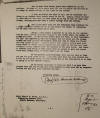
|
28 August
1928.
Letter from Gen. Feland, Managua, to "My
dear Utley," Puerto Cabezas, p. 2.
" . . . Now to
make this border guard most effective is
the problem. We have all this extra work
for the elections and we have to be
ready to strike at any of the bands we
can locate. ¶ I feel confident now that
it will not be necessary for Edson to go
farther than Poteca where he now is.
Dunlap should be able to take care of
the rest in fact later on he may be able
to take over Poteca, letting your men
drop a little farther down the stream. ¶
And if you want them and the situation
then requires it, I might send you
another 60 or 70 men around the middle
of September. Let me know what you think
about this. ¶ Utley, I was rather
surprised to be told by the Admiral that
you had a letter from the Captain of the
Denver about the number of planes you
have. It was to the effect that you
felt, or your headquarters had the
impression, that the Brigade did not
allow you the planes needed and that in
fact the Brigade does not seem to think
you should have any planes at all. I
don’t assume that Allen’s letter gave
your exact words or views, and of course
you are right in talking over your
situation in all aspects with the
Captain of the ship there. But there is
another side which is that there were no
planes to give you except those more
needed here, of which need I am the
judge. ¶ As the general plan develops,
will let you know so that you can fit
your plans to it. I am very glad that
you have started the outfit up the Bocay
river as that should get us the
information as to what is going on in
the Garrobo region. ¶ It is hardly
necessary to tell you that I am more
than pleased with the way things have
been handled in your area and my
congratulations are due you, your
officers and men. ¶ Sincerely yours, ¶
[signed] by General Feland."
|
|

|
29 August
1928 (1022).
Radiogram from Major H. H. Utley, Puerto
Cabezas, to Gen. Feland, Managua; copies
to CO Bocay, Capt. Linscott.
"TO: COMDR SECBRIG
MANAGUA. INFO: 29 AUGUST, 1928. CO
BOCAY. CAPTAIN LINSCOTT (AIR MAIL) FROM:
COMDR EASTERN AREA. ¶ 8630 DAILY REPORT
TWENTY NINTH STOP FLIGHT TODAY TO WASPUC
DASH BOCAY DASH RIVER PATROL DASH CUVALI
DASH LA LUZ DASH NEPTUNE MINE STOP
WALKER NOW FIFTEEN MILES ABOVE CASCA
STOP PIS PIS OUTPOST MOVED FROM EDEN
MINE TO NEPTUNE MINE STOP LINSCOTT
REMAINS AT CULVALI PREPARED TO MOVE
NORTHWEST TOWARDS GARROBO OR WEST
TOWARDS CACAO IN CASE WALKERS ADVANCE
FORCES THE OUTLAWS IN EITHER DIRECTION
STOP ARROLIGA REPORTED AGAIN ACTIVE NEAR
MINING AREAS STOP RUMOR FROM EDEN MINE
THAT BANDIT PATROLS ARE OBTAINING
SUPPLIES OF COFFEE AND CATTLE FROM
AUGUSTINE RIVERA AT CASA VIEJA STOP
DECARRE AT BOCAY REPORTS THIRTY OUTLAWS
VICINITY OF GARROBO COMMA MORE DYNAMITE
REPORTED AS LEFT BY SANDINO ALONG BOCAY
RIVER COMMA THAT JIRON HAS LEFT SANDINO
AND IS NOW ALONE WITH SMALL COMMAND
COMMA ALTIMIRANO ALSO OPERATING ALONE IN
CUA DISTRICT STOP THIS INFORMATION FROM
INDIAN BOATMEN RECENTLY WITH THE BANDITS
STOP PREVIOUS REPORTS FROM SIMILAR
SOURCES HAVE PROVED CORRECT STOP REPORTS
FROM EDSON ALSO INDICATE THAT THE OUTLAW
FORCE HAS DIVIDED BETWEEN CUA RIVER
DISTRICT AND MURRA AREA STOP REPORTS
INDICATE THAT PERMANENT OUTPOSTS AT BANA
COMMA CUA AND CACAO NECESSARY TO BLOCK
POSSIBLE ROUTES OF RETREAT NOW OPEN TO
OUTLAWS 1022."
|
|
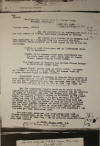
|
30 August
1928.
Message from Major Oliver Floyd, Managua, to
Capt. Edson, Poteca.
|
|
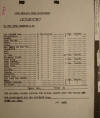
|
30 August
1928.
Distribution of civilian police &
hacienda guards, Major A. B. Sage,
Bluefields, to Jefe Director GN,
Managua.
|
|

|
31 August
1928 (1430).
Radiogram from Major H. H. Utley, Puerto
Cabezas, to Gen. Feland, Managua.
|
|
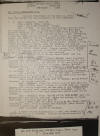
|
2 September
1928.
Air Patrol Memorandum #72, extracts,
from Managua to Poteca, Garrobo, Bocay
River area (no
author indicated).
"1. Extracts from
report of Air Mission, dated 1 Sept,
1928, are quoted for the information of
all concerned: ¶ 2. 0845 – MANAGUA: Took
off. ¶ 0958: SANTA ELENA: Normal. ¶ 1002
– SUA RIVER JUNCTION: Normal. ¶ 1017 –
POTECA: Dropped mail and medical
supplies which were retrieved. Picked up
following message: ‘TO B-2; 8501
TABLASCO TRAIL HAS NOT REPEAT NOT BEEN
USED SINCE 8-16-28. NO REPEAT NO CONTACT
WITH GROUP REPORTED MY 8631-1000.
ADDITIONAL INFORMATION FROM BRAULIO
MORALES – PANCHO GARCIA and RAMIRES
GAROTA, SUB JEFES OF SANDINO, PROCEEDED
SANDINO OVER RAMA – MURRA TRAIL BY SIX
OR SEVEN DAYS WITH ABOUT TWENTY FIVE
MULES, WITH ORDERS TO WAIT FOR HIM IN
VICINITY TAMIS CANYON. REPORTS A TRAIL
EXISTS FROM MURRA TO POTECA RIVER VIA
CONGOJAS AND FROM LOS MAXCONS (WILLEY
SKETOR) TO HONDURAS. TRAIL ALSO
CONNECTED TAMIS AND CONGOJAS RIVER –
EDSON 0843’. Dropped message that
WAMBLAN RIVER AREA would be searched to
GARROBO. The patrols of Capts. Linscott
and Walker should be in that vicinity. ¶
1025: WAMBLAN: Panel ‘Marie Patrol EAST’
laid out. ¶ 1050 – BOCAY: Normal. ¶
1053: GARROBO: Capt. Walker’s patrol,
panel displayed. ‘ARRIVED HERE
YESTERDAY’. A message was dropped asking
for verification if their location was
GARROBO; if the patrol was Capt.
Walker’s and if they had anything to
report. Panels ‘GARROBO’ – ‘WALKER’S
PATROL’ – ‘NO ENEMY’ and ‘NOTHING TO
REPORT’ laid out. ¶ 1100 – Searched
BOCAY RIVER AREA beyond PASO REAL de CUA
to headwaters but was unable to locate
patrol of Capt. Linscott. ¶ 1135 –
GARROBO: Dropped message that Capt.
Linscott’s patrol could not be located
and that nothing suspicious had been
observed along the BOCAY RIVER to its
source. ¶ 1158 – THREE FOURTHS MILES
EAST OF WAMBLAN: Marine Patrol observed.
No panels displayed. ¶ 1200 – WAMBLAN:
Panel ‘No further need of you’ laid out.
¶ 1202 – POTECA: Panel ‘Nothing to
report’ laid out. Dropped message that
nothing suspicious had been seen in the
WAMBLAN-BOCAY RIVER AREA and gave panel
signals received from Capt. Walker at
GARROBO and information that Capt.
Linscott’s patrol could not be located.
¶ 1210 – GUIGUILI: Panel ‘MARINE PATROL
DOWN RIVER’ laid out. Dropped mail and
message that Capt. Edson had nothing to
report. Made pick up of routine mail for
Area CO. ¶ 1325- SANTA CRUZ: The plane
piloted by Maj. Bourne returned via
OCOCTAL making drop of pickup from
GUIGUILI. Lieut. Lamson-Scribner
returned direct to MANAGUA. ¶ 1330 –
MANAGUA: Landed at Airdrome. ¶ 3. A
letter marked CONFIDENTIAL for B-2, was
picked up at POTECA and brought to
MANAGUA. Nothing suspicious was noted in
the area patrolled."
|
|
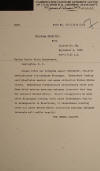
|
4 September
1928.
Telegram from the Mengel Company,
Louisville KY, to the Sec. State,
Washington D.C.
|
|
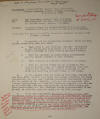
|
1. 5 September
1928.
Tentative plans for redistribution of
command upon withdrawal of Fleet Marines
and Bluejacket Battalion,
Major H. H. Utley,
Puerto Cabezas, p. 1.
"References: (a)
Chief of Staff’s Memorandum dated 15
August, 1928, subject as above. ¶ 1. In
arriving at the conclusions expressed
below the following assumptions have
been made: ¶ a. That prior to the
election, organized resistance to our
forces will have ceased and open
opposition will be limited to small
parties of local robbers. ¶ b. That the
election is successfully accomplished
and its result accepted by both parties.
¶ c. That there is no extended outbreak
in Honduras. ¶ d. That the present
policy of the Guardia is the Area
continues: i.e., the police functions
are taken over in the south first,
working gradually to the north and
beginning on each river, at its mouth. ¶
2. At the present time the force in this
area consists of the 51st, 59th and 60th
Companies, the Denver, Galveston and
Tulsa Detachments, and the West Virginia
Detachment temporarily attached for the
period of the election. Each company is
organized into Company Headquarters and
three (3) Platoons, strength
approximately 133 enlisted; with one
platoon added to the 51st Company for
Area Headquarters, and the Electoral
Detail (approximately 75 enlisted) in
addition, assigned mainly to the 51st
Company. ¶ 3. Posts are established at
POTECA, BOCAY, WASPUC, with connecting
posts of a squad or a section at
intermediate strategic points to protect
the line of communication and one squad
at CAPE GRACIAS A DIOS. Posts are
established at LA LUZ and in the PIS PIS
Mining District with one squad at
PRINZAPOLKA. In the Southern Sector
there is a section at QUEPI, one at EL
GALLO, and one at MUELLE DE LOS BUEYES,
with one squad at RIO GRANDE BAR. The
two main posts are at BLUEFIELDS and
PUERTO CABEZAS . . . "
|
|
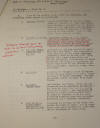
|
2. 5 September
1928.
Tentative plans for redistribution of
command upon withdrawal of Fleet Marines
and Bluejacket Battalion,
Major H. H. Utley,
Puerto Cabezas, p. 2.
" . . . 4. I am of
the opinion that, after the election,
the following posts should be
maintained: ¶ a. PUERTO CABEZAS: Readily
accessible to the U.S. Facilities for
caring for sick, quartering rear
echelons, preservation of stores,
training and recreation are available.
Largest single investment of foreign
capital on this coast. Will be last
point taken over by Guardia. ¶ b. WASPUC
AND BOCAY: Strategic points on WANKS
River. Have been occupied for some time
and withdrawal will leave inhabitants,
especially indians, at mercy of local
robbers and ex-bandit sympathizers. ¶ c.
PIS PIS Mining district and LA LUZ:
American and foreign capital invested in
both localities. Time required to move
from one to the other precludes
protecting both by single post.
Withdrawal will leave these mines and
stores pertaining thereto open to local
marauders and result in complaints to
State Department or our failure to
afford protection. Quarters, water,
etc., available. ¶ d. EL GALLO: Location
of principal plant of Cuyamel Fruit
Company, close to LA CRUZ, always the
scene of minor disorders. Quarters
available. Easily supplied from
Bluefields. ¶ e. EL BLUFF (Bluefields):
Politically important. There are two
strategic points requiring protection –
the bank in BLUEFIELDS and the Custom
House at EL BLUFF. The occupation of
either by Marines will protect both. El
Bluff is believed to be the more
desirable location from both an
administrative and a tactical
standpoint. ¶ f. CAPE GRACIAS,
PRINZAPOLKA, RIO GRANDE BAR: Necessary
to protect stores being forwarded to
posts up river. Can be withdrawn soon
after Guardia has taken over police
functions at these posts . . . "
|
|
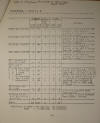
|
3. 5 September
1928.
Tentative plans for redistribution of
command upon withdrawal of Fleet Marines
and Bluejacket Battalion,
Major H. H. Utley,
Puerto Cabezas, p. 3.
[Table listing
outposts and number of troops in Eastern
Area, with remarks. Outposts are:
Bocay, Waspuc, La Luz, Pis Pis, Cape
Gracias a Dios, Prinzapolka, Puerto
Cabezas, Rio Grande Bar, El Gallo, El
Bluff. Aggregate: Marines: 18
Officers, 428 enlisted. Navy: 3
Officers, 14 enlisted.]
|
|
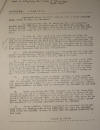
|
4. 5 September
1928.
Tentative plans for redistribution of
command upon withdrawal of Fleet Marines
and Bluejacket Battalion,
Major H. H. Utley,
Puerto Cabezas, p. 4. "
. . . Personnel shown at PUERTO CABEZAS
and EL BLUFF includes sick, short
timers, and reserves. ¶ No replacements
will be necessary for a considerable
period except officers, enlisted men of
the first two grades, and Navy attached.
Normal attrition will be taken care of
by the withdrawal of the posts at CAPE
GRACIAS, PRINZAPOLKA, and RIO GRANDE
BAR. ¶ It will be noted that this
distribution provides for three
companies of Company Headquarters and
three (3) platoons each, one of the
platoons of the 51st Company being Area
Headquarters. All radio operators are
assigned to this platoon to facilitate
training and assignment. It is
recommended that all enlisted men of the
Navy be similarly assigned to the same
platoon and carried as on detached duty
when elsewhere than at Area
Headquarters. ¶ 5. This distribution
permits the withdrawal of the West
Virginia Detachment immediately after
election – by 10 November if embarked at
CAPE GRACIAS, PUERTO CABEZAS, and
BLUEFIELDS. ¶ 6. The Tulsa, Galveston,
and Denver Detachments and 1 officer
(Captain Edson) of the Rochester
Detachment will be available for
transfer from PUERTO CABEZAS during
December. As both officers and men have
personal effects stored at PUERTO
CABEZAS it is urgent that their
withdrawal be affected via that post.
The above is based on the assumptions
stated in paragraph 1 a, 1 b, and 1 c
above. In my opinion an earlier
withdrawal would be inadvisable. ¶ 7.
Four officers, Major De Carre, Captain
Kendall, Captain [---], and Second
Lieutenant Crawford, and about 145
enlisted men will be available for
transfer when the Electoral Detail is
released and transportation within the
Area is available. One Medical Officer
and three enlisted medical will be
available for transfer at the same time.
¶ 8. There are thirty-two (32) enlisted
men in the three companies who are due
for return to the United States by
reason of approaching expiration of
enlistment or completion of tour of
foreign service prior to 1 January 1929.
It is recommended that these be included
in those referred to in paragraph seven
above, leaving about 123 available for
transfer elsewhere within the brigade. ¶
9. In my opinion, further reduction of
personnel should depend upon the
developments of the situation and upon
the celerity with which the Guardia is
able to take over the police functions
of the Area. ¶ HAROLD H. UTLEY."
|
|
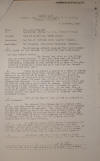
|
6 September
1928.
Plan of Operations, Murra region, K. I.
Buse, Managua, by direction of
Northern Area
Commander, Ocotal, to Capt. M. A.
Edson, Gulkey's Camp [Enrique Gulke's
Mahogany Camp, Río Poteca].
|
|
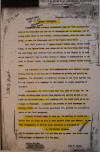
|
6 September
1928.
"Sandino Situation,"
Major Fred T.
Cruse, Military Attaché, Tegucigalpa, to
Secretary of State, Washington.
"During the week
evidence accumulated that no only
Sandino, but most of his followers are
now out of Nicaragua and in Honduras,
but of course still close to the border.
Sandino himself, with his usual small
group, is near the Nicaraguan and of the
Piedra Chata Trail. ¶ This trail starts
at J. Amada Flores’ lumber camp, called
Piedra Chata, on the Patuca River, and
comes out on the Coco River near Bocay.
The government here realizes that the
matter is now largely up to them and as
Sandino’s only possible source of supply
or communication is the trail to Flores
place, the President on Saturday ordered
Flores brought here. ¶ The intention is
to get into communication with Sandino
through Flores, and try to get him out
of Honduras as quickly and quietly as
possible. The Government is perfectly
willing to use force against him, but
the prospect of a campaign in that
region is simply appalling to consider.
¶ A messenger, the first since July 6th,
came in on Aug. 23. We brought an
unimportant letter from Sandino – no
mention at all of the fight on the
Poteca River, for instance – but the
usual stuff about uprisings in
Nicaragua. I reported the arrival of
this messenger to General Pineda, and
the police questioned him getting the
information given in the first
paragraph. ¶ Turcios is about ready to
blow up. In addition to losing the
income from his Ariel he gets no more
Sandino funds from Mexico. He has made
arrangements to have El Ariel published
in Guatemala by J. Constantino Gonzales
and in Salvador also, but I do not know
yet by whom. The first issue from
Salvador is expected in a few days."
|
|

|
7 September
1928 (0800).
Radiogram from Capt. Walker, Garrobo, to
CO Northern Sector.
|
|

|
7 September
1928 (1012).
Radiogram from Gen. Feland, Managua, to
Major H. H. Utley, Puerto Cabezas.
|
|

|
7 September
1928 (1042).
Radiogram from Gen. Feland, Managua, to
Major H. H. Utley, Puerto Cabezas.
|
|
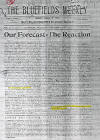
|
8 September
1928.
"Our Forecast = The Reaction,"
The
Bluefields Weekly.
|
|
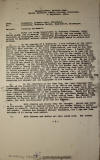
|
8 September
1928.
Civilian Prisoners, Report by
Major H.
H. Utley, Puerto Cabezas, to Commander,
Southern Sector, Bluefields, p. 1.
"1. There are
being transferred by Schooner Ultramar,
under Marine guard, two prisoners,
Johnson and Gallop, who are charged with
violation of Nicaraguan law – recruiting
Nicaraguan citizens for labor outside of
Nicaragua without taking the necessary
steps to obtain permission. ¶ 2. On the
evening of 5 September, I was informed
by the representative of the British
Consul that these men were British
subjects, that they were confirmed at
the local Commandancia, and that he had
been unable to ascertain what the
charges were against them. I immediately
called upon the Commandante who seemed
very uncertain as to what law had been
violated, or the provisions of the law,
but in the course of my interview,
stated that as a side issue he believed
the money for the transportation of
these laborers was being furnished by
the Conservative Party, to the end that
Liberal laborers would not be here to
vote. He was unable to furnish any proof
of this statement, nor to even offer any
witnesses in support thereof. On the
following morning the manager of the
Bragmans Bluff Fruit & Lumber Company
called upon me and stated that the men
had been arrested at his request, as
they were recruiting farm labor contrary
to verbal agreement between them and
himself, he having no objections to the
orderly removal of carpenters, plumbers,
masons, etc., as there was a surplus of
this class of labor; whereas there was
an acute shortage in farm labor. He
stated further that these labors were
being recruited for work on United Fruit
Company projects. The witnesses he
offered to substantiate his charges are
all employees of his Company. ¶ 3. On
the afternoon of the same day, the local
Campaign Committee of the Conservative
party came to my office and charged the
local Commandante with intimidation of
Conservative voters in that these men
being friends of theirs, their arrest
would frighten other Conservatives from
consorting with members of the Campaign
Committee. There was no evidence offered
or obtainable as to either of the
political charges, these charges being
conclusions deduced by those making
them. The charges were reported to
Captain Best, Vice Chairman of the
Electoral Board on this Coast, for such
investigation as he saw fit to make. ¶
4. Both Johnson and Gallop deny the
charges. Gallop had prior to his arrest,
posted at various points, in and around
Rilway, a notice signed by himself,
stating that he was not desirous of
employing any labor for export. Johnson
had prepared similar statement, but I
cannot find evidence of it having been
posted. ¶ 5. Both Johnson and Gallop are
well known here. The former . . . "
|
|
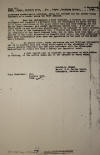
|
8 September
1928.
Civilian Prisoners, Report by
Major H.
H. Utley, Puerto Cabezas, to Commander,
Southern Sector, Bluefields, p. 2.
" . . . possesses
considerable influence among the Indians
and the latter being somewhat of a
leader among the West Indians. ¶ 6. From
the information I have obtained, I
believe the charges unfounded but
consider it probable that the statement
of these two men as to labor conditions
at the place where they had been working
for the United Fruit Company, has caused
additional unrest here. I do not believe
there is any political significance to
be attached to their actions, nor to
those of the Commandante who, I believe
was inspired solely by the officials of
the Fruit Company here, who in turn,
have been much worried by the labor
situation as regards farm labor, and
very naturally look with considerable
fear upon any aggression on the part of
the United Fruit Company. ¶ 7. As stated
above, these prisoners are not Military
Prisoners, but it is desired that you
bring their cases to the attention of
the proper Guardia officials and use
your influence with the Nicaraguan
authorities to obtain for them a speedy
and impartial trial. ¶ 8. A full report
will be rendered in duplicate to this
office in writing, of the action taken
and of the result of their trial. ¶
HAROLD H. UTLEY, ¶ Major, U.S. Marine
Corps. ¶ Commander, Eastern Area."
|
|

|
8 September
1928 (1800).
Radiogram from Capt. Walker,
Garrobo, to
CO Northern Sector.
|
|

|
10 September
1928 (0932).
Radiogram from Major H. H. Utley, Puerto
Cabezas, to Gen. Feland, Managua.
|
|

|
12 September
1928 (0822).
Radiogram from Gen. Feland,
Managua, to
Major H. H. Utley, Puerto Cabezas.
|
|

|
12 September
1928 (0913).
Radiogram from Gen. Feland, Managua, to
Major H. H. Utley, Puerto Cabezas.
|
|
|
|
|
PREVIOUS
NEXT
|
|
|
|
|
|
|
|
